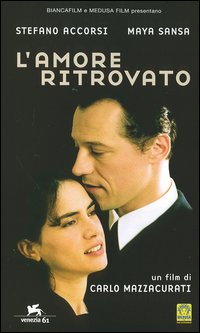
L'AMORE RITROVATO
Italy, 2004, 118 minutes, Colour.
Stefano Accorsi, Maya Sansa.
Directed by Carlo Mazzacurati.
L’ Amore Retrovato is a very old-fashioned kind of film. It is set in 1936, the time of fascism in Italy (although fascist pressure does not appear explicitly in the film except for the invasion of Abyssinia by Mussolini in 1936 and the men being called up for active service). Instead, the film focuses on ordinary people, relationships, an affair.
Stefano Accorsi, who was appearing in many Italian films at the beginning of the 21st century, is a banker who encounters a young woman with whom he had a relationship in the past. She responds tentatively, especially when he does not recognise her on the train, then gives herself fully to the affair. She is played by Maya Sansa (Good Morning Night) and has a very vibrant screen presence which means that audiences identify more with her than with Accorsi.
Audiences do not see Accorsi’s wife and child until quite late in the film and then only from the point of view of the woman, sympathy being with the two having their affair. There are echoes of Brief Encounter with so much of theit meeting happening at railway stations and on trains. The colour photography is quite lush, the Tuscan and Ligurian coast, the country towns. There is also an evocative atmosphere of the period – just before the outbreak of World War II. A postscript set in 1945 shows the devastation experienced during the war, the hunger and poverty, people travelling on trains in open cattle trucks, people about to try to rehabilitate themselves and their lives.
For those who do not like this kind of old-fashioned film, it is too much of a lush and sentimental romance. On the other hand, this means that it could well have great appeal to a popular audience.
1.A romantic period story? Italian style?
2.Tuscany, 1936, the country town, the landscapes? The coast and the beaches? The Italian western coast? The cities? A setting for this kind of romantic story of the past?
3.The re-creation of the world of 1936, costumes and décor, the banks, the homes, the railway stations? The amount of time the film spent in trains? The railway lines? Restaurants, dance rooms? The atmosphere of the invasion of East Africa? The non-obtrusive presence of fascism? The scenes from the Italian films of the period? The musical score, emotional score?
4.The novel on which the film was based: A Relationship? Giovanni in the train, his attraction towards the woman, his getting out, not recognising Maria, looking back, remembering her? The memories of her on the beach – and her blonde hair? The impact of seeing her again? Going to the station, the chance encounter? The beginning of the affair?
5.Giovanni, his age, experience, working in the bank, seeing him at work, the boss and his severity, the fellow workers? His travelling by train? Audiences not seeing his wife and child until well into the second part of the film? His not being in love with his wife? Yet the scene of tenderness with her and the child?
6.His visit to Maria’s house, meeting the father, bank business, having the coffee, the discussions with Maria’s sister? Finding out about her visits?
7.Maria, her background, her relationship with Giovanni? Becoming a manicurist, leaving home, the visits home? The encounter, watching the film – and the end of an affair? Her decision to go on with the affair?
8.The relationship, in the woods, on the beach? The sexual and sensual nature of the affair? Meeting on Mondays, his pretending he was working back, getting later trains? The deceit? The father and his attempt to blackmail, the sister’s visit to the bank, Giovanni’s anger? Maria and her response and paying back the money?
9.The recovery of the affair? Maria’s joy? Giovanni and the invasion of Africa, his joining the military, training, uniform, his visits?
10.The train rides, and the irony of military not being allowed to ride in third class? The ticket collector, his friendship with Giovanni, football teams – and the renewed friendship at the end of the film?
11.Maria seeing Giovanni’s wife, the effect on her, the decision to break off? Giovanni and his shock? The handling of the situation, Maria and her decision, leaving him in the train? His trying to see her and follow her?
12.The gap of nine years? The aftermath of World War Two? The people crowded on the train trucks? Maria with the child? Noticing Giovanni? Their talk, her marriage, her husband in the camp, waiting for him to come home? The memories of the affair? The changes in their lives?
13.A romantic film, an old-fashioned film, an emotional film?